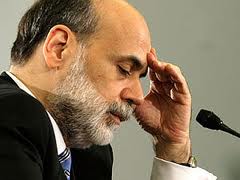Optimism Lost, and by Optimism, I mean Ben Bernanke and the NYT
The New York Times ran a story yesterday under the headline: Gloom Grips Consumers, and it May Be Home Prices. And all I could think to say was… “MAY?”
It “MAY” be home prices? Like maybe it’s NOT home prices? Okay, I get it… maybe it’s that Charlie Sheen isn’t on “Two and a Half Men” anymore? That could be it, I suppose, it’s sure as heck got me down.
The Times story quotes the patriarch of the Markey family, who apparently lost his stone cutting business in 2009, sold the family home for half a million less than its value during the bubble and moved into a smaller one, gave up two new cars and bought a used one… you know, they Obamasized.
(I think that’s what we should call it when that sort of thing happens. You know, there’s downsize, there’s upsize and then there’s Obamasize.)
The Times quoted Mr. Markey…
“For two years I kept thinking that things would get better,” Mr. Markey, 51, said as he stood in his empty store on a recent weekday. “Now I think the future doesn’t look so good.”
According to the Times, we the people have a “confidence problem.” They say we’ve “turned gloomy about tomorrow,” and as consumers we’re “holding back.”
I’m sorry, but is that the problem? It’s a crisis of confidence? Like, all we need is a little counseling? Like, a thousand Dr. Phils is all we need to save the economy?
I think the nice folks at the New York Times have been spending too much time at Zabars? Because I’m pretty sure it’s not a confidence deficiency… I think it’s money we’re missing… as in income, and the lack of available credit, isn’t that right?
Okay, whatever… so, then the Times story said the following:
“There are good reasons for gloom — incomes have declined, many people cannot find jobs, few trust the government to make things better — but as Federal Reserve chairman, Ben S. Bernanke, noted earlier this year, those problems are not sufficient to explain the depth of the funk.”
The first part is fine… incomes down… check. Homes haven’t just declined… they’ve been cut in half or more. No jobs… okay. Trust the government to make things better… ummm, well… that would be… absolutely no one.
But Ben Bernanke noted that the problems aren’t sufficient to explain the depth of the funk? Bernanke noted that, did he? Are you f#@king kidding me? Is that what that dismal-science-doofus said? Well, therein lies the heart of the problem. You want top know why no one trusts the government to make things better? Well, there you have it… ladies and gentlemen… I give you Ben Bernutcase.
Okay, back to the Times story…
“That has led a growing number of economists to argue that the collapse of housing prices, a defining feature of this downturn, is also a critical and underappreciated impediment to recovery. Americans have lost a vast amount of wealth, and they have lost faith in housing as an investment. They lack money, and they lack the confidence that they will have more money tomorrow.”
Did I read that correctly? Economists are arguing as to whether the collapse of housing prices is a “CRITICAL AND UNDERAPPRECIATED IMPEDIMENT TO RECOVERY?”
Critical AND underappreciated? How can something be critical AND underappreciated? Doesn’t someone get fired if something is found to be both critical AND underappreciated? Because I can think of situations in which you get killed because of something being critical AND underappreciated.
Alright… I have to calm down. I have a daughter.
What in the… No, I can’t… it’s just that… oh my God… but did they just… I’m going to… you know what… no, no way am I going to… even if they aren’t… or even if they are, because… what I want to say is… no, they shouldn’t… how can they… stop, wait… calm… should I just… Holy Mother of… if he doesn’t shut the… I think the only way… but not if… don’t they ever… but what about… no, as I walk through the valley of the shadow of death I shall fear no evil… arrrggghhhh.
You see… that wasn’t even productive. They’ve reduced me to being a babbling brook, I’m starting to talk like Mark Zandi on Lithium. Sure, you can laugh, but what if someday, I read something like that… critical AND underappreciated… and my head explodes? What then, right? Who will be laughing then, I ask you?
Critical AND underappreciated… hmmm… kind of like essential but unrecognized. I really can’t take much more of this sort of thing.
Are those grown up economists they’re referring to, or are we talking about 8 year-old economists? Are they human economists… is it possible we’ve got armadillo economists on the job. Because I would totally understand if an armadillo economist got that wrong. I mean armadillos don’t even talk or anything, right? They’re like possums from New Mexico, right? Someone please… tell me we’ve hired armadillo economists.
And then the Times said the following:
Many say they believe that the bust has permanently changed their financial trajectory.
Well, let me tell you about that, since there’s obviously no chance whatsoever of you figuring anything out on your own. They didn’t think that way when the economic downturn happened. But after watching you guys botch everything you’ve touched over the last few years, while telling us we’re having a recovery, and well… you know, had someone read my blog for the last two years, you could have avoided all of this, does anyone realize that?
And back to the Times story…
“People don’t expect their home to regain value, and that’s really led to a change in consumer attitudes about the economy that we’ve just never seen before,” said Richard Curtin, a professor of economics at the University of Michigan who directs its Survey of Consumers. The latest data from the survey, released Friday by Thomson Reuters, shows that expectations for economic growth have fallen to the lowest level since May 1980.
I’ve had professors like this guy Richard Curtin before, unable to think without instructions and a road map. The guy’s probably a brilliant something-or-other, but we wouldn’t recognize what that might be if someone drew up a picture.
Now, that’s nothing… wait until you read this next paragraph…
Economists have only recently devoted serious study to how a decline in housing prices affects consumer spending, not least because this is the first decline in the average price of an American home since the Great Depression. A 2007 review of existing research by the Congressional Budget Office reported that people reduce spending by $20 to $70 a year for every $1,000 decline in the value of their home.
Okay, that’s it… ball four… take a hike… you’re done. Stop it right now. Back away from the research report, guys… you’re going to get us killed. Seriously, if this isn’t scaring the heck out of you, then let me just remind you that this is The New York Times we’re reading here… this is the smart newspaper. God help those who get their news by looking at the pictures in USA Today.
Alright, I wasn’t going to do this but give me one more… sure I’m scared, but go ahead…
“This “wealth effect” is significantly larger for changes in home equity than in the value of other investments, such as stocks, apparently because people regard changes in housing prices as more likely to endure.”
Oh dear God. Okay, I have two very important things to say:
A. I’m not going to go search for it now, but I wrote about that very concept two years ago. I wrote that the “wealth effect” that economists have been studying and linking to the stock market was actually wrong. It was always housing, not the stock market, with the possible exception of 1998-1999, and even then, not really.
When they would correlate the stock market to the wealth effect, it was always at a time when housing prices were at least stable and more than likely appreciating. So, they thought it was the stock market, but really the stock market was never a primary or independent variable, homes were always primary and independent.
Why the heck do you think I’ve been writing what I’ve been writing for the last three years? Oh God… talk about wasting time and money, do you know how much money I’ve spent to accomplish absolutely nothing… I feel sick… this is what NASA must feel like all the time.
B. And “apparently because people regard changes in housing prices as more likely to endure?” No, no, no… which one of your robot reports told you that, genius? That’s wrong, wrong, wrong. Don’t you know any actual people… I mean real people… not like my parents kind of people, but real, regular people? You really don’t, do you?
Okay, look… and pay attention please, you need to understand this or we’re all screwed. Houses are America’s long-term savings account… money we can’t get out of an ATM. Stocks we know go up and down, but we also know that we have a very definite tendency to buy high and sell low.
You can’t even find a CPA in this country who can tell you what his or her average return on stocks has been for the last ten or twenty years… or five, for that matter. No one knows the answer to that question, and it’s not because they can’t do the math. It’s because they don’t want to know the answer.
But, you see… our homes are our retirement safety net. We don’t care what our ROI is, we’ll pay them off in 30 years and then have something significant no matter what. We’ll start saving at 55 too, and probably put away something more as well, but no mater what… we’ll have our homes… and they’ll be worth a significant amount, and there’s no way we’re willing to drive this country through our consumer spending without them.
You can’t even find a CPA in this country who can tell you what his or her average return on stocks has been for the last ten or twenty years… or five, for that matter. No one knows the answer to that question, and it’s not because they can’t do the math. It’s because they don’t want to know the answer.
But, you see… our homes are our retirement safety net. We don’t care what our ROI is, we’ll pay them off in 30 years and then have something significant no matter what. We’ll start saving at 55 too, and probably put away something more as well, but no mater what… we’ll have our homes… and they’ll be worth a significant amount, and there’s no way we’re willing to drive this country through our consumer spending without them.
But, what you’ve allowed to happen is inconceivable to us. You stood by while Wall Street gazillionaires defrauded the planet and shut down the credit markets completely and possibly forever. Then you let that fester and grow such that housing prices went into a free fall. And you did all that right after allowing mortgage bankers to sell us a bunch of loan products expressly designed to be refinanced every few years.
It’s the trifecta of idiocy.
Worse still, when you had a chance to do something about it, you blew it at every single turn in the road… HAMP being one of your greatest hits, but there were lots of others. And like sprinkles on top of a cupcake, you did nothing while our mortgage servicers did everything they could think of to abuse us… except literally peeing in our hair.
Hey Democrats… remember the midterms? When you guys got shellacked, as the president put it? Are you picking up on why that happened yet? Is any of this ringing any bells, you collection of oblivious potted plants? I knew Obama was actually surprised that you guys lost so badly… I knew it. He really was surprised. And I’m sure it’s because someone’s research report didn’t indicate the proper coordinates or some such nonsense.
Here’s a tip for next time… LEAVE YOUR OFFICES. You’re welcome to call me and I’ll take you for a drive around real America anytime. Actually, you probably don’t recall, but I offered that several times last time around too. Leave your research reports behind, you won’t need to determine anything statistically significant, I promise. It’ll be overwhelmingly in one direction.
Okay, NYT… let me have it…
“A recent paper by Karl E. Case, an economics professor at Wellesley College, and two co-authors estimated the decline in home prices from 2005 to 2009 caused consumer spending to be $240 billion lower in 2010 than it otherwise would have been. That figure is equal to about 1.7 percent of annual economic activity, enough to be the difference between the mediocre recent growth and healthy growth. And it does not include all the other effects of the housing crash, including the low level of new home construction, that are also weighing on the economy.”
You guys would turn checkers into chess, wouldn’t you? It’s checkers, damn it… just checkers. This is America… we play checkers. Chess is for communists. Just go on, I’m not even going to respond to that paragraph… it’s too stupid for words and I don’t want to encourage you to do more of that sort of thing. That’s the kind of crap that got you and us in all this trouble, got it? Cut it out right now.
And someone please say the following to Professor Case… “Alrighty now, we’ll let you go back to bed now.”
Let’s move along…
“Roy Pugsley, who owns a pool supply stor 2010ore in Winter Garden, another suburb here, said that he made 2,500 fewer sales during the first eight months of 2011 compared with the same period in 2007. That translates to one less person walking through the doors to buy chemicals or toys or spare parts in each hour that the store is open.”
Hey, now you’re getting closer… was that so difficult to do? Was Ron Pugsley too busy to speak with you in 2008, 2009, or 2010? Did you have trouble getting a meet up with the Pugmeister? Call me next time, I’ll make sure you get in.
Is there really more? Seriously? And people say I write long articles….
“Mr. Pugsley said business actually increased in the early days of the recession; customers had told him they were spending more time at home. But now people buy only what they need for maintenance. “People realized that it wasn’t going to get any better, and they stopped spending on their pools, too,” he said.”
Now, do you see how quickly old Pug figured out what was happening there? He didn’t need a research report. He was just using his good old, God-given common sense. All business owners have it. We keep our finger on the pulse, because if we don’t… we go broke, our children can’t keep up with their peers, and our wives leave us for their dentists. That’s some seriously motivating stuff, right there, let me tell you. Plus there’s payroll, which for us, doesn’t just show up on a cloud from above.
Okay, next slide:
“At Milcarsky’s Appliance Center in the adjacent town of Longwood, business now comes from people remodeling their own homes rather than builders, and customers are picking cheaper models, said Doug Morey, a sales manager.”
Ahhh, good old Milcarsky’s… a darn fine place to pick up an appliance. But, one question… why are we talking to Doug the sales guy? Only time we need to talk to Doug is when we’re in the market for an appliance.
“People who might have bought that” — he taps a stove with chunky burners, designed to look like it belongs in a restaurant kitchen — “are double-thinking it. Everyone has had to cut back.”
See what I mean. Double-thinking it? Everyone had to cut back, so duh? That’s not helpful. Keep going…
“That means Milcarsky’s has cut back too. The company, which employed 26 people three years ago, now has about a dozen workers, and they are making less in salary and commissions.”
See, you didn’t get that from Doug, now did you? Nope, you got that information from old man Milcarsky himself, am I right. Or, maybe from his wife if she still comes in to look over the bookkeeper’s shoulder one a week. Right? Yes, I’m right. Doug wouldn’t know that, and if I have to explain why that is, then you need serious lessons in small business management.
Next slide…
“I might like to think that I’m middle class, but I’m not. I’m not anymore,” said Rae-Anne Crotty, a customer service manager at the store. She now shops for groceries at discount stores, she said, and buys gifts for her children at Christmas but not on their birthdays.
No, no, no… you don’t need this information. Anne may have liked to think she’s middle class, but she wasn’t before and she’s not now. She should have been shopping at discount stores all along, and it’s not her whose lifestyle has changed… it’s the Milcarskys.
Also, don’t let Anne fool you. If she really didn’t buy her kids birthday presents, and I doubt that very much, then it’s because she either took them on a vacation instead or her parents spoiled them both with new bikes and a day at the amusement park. Care to bet on whether I’m right?
Next slide…
“It remains the prevailing view of economic policy makers that economic activity will eventually return to the same trajectory as before the recession. Mr. Bernanke and others have said that they see no evidence of any permanent change in the economy. Previous bouts of economic pessimism, as in the early 1980s and early 1990s, went away once growth picked up.”
See, we’re in real trouble, that man runs the Fed. But at least we’ve identified the source of the problem, or at least one of the sources. I should have known it was him. My parents are college professor types, as are their friends, and none of them could keep a hot dog stand open for the summer either.
Bernanke hasn’t been right yet, since the meltdown began during the summer of 2007, and in fact he doesn’t even seem to know that the meltdown began during the summer of 2007.
Just the fact that he and others could possibly say that they see no evidence of permanent change in the economy is more than enough for me… can I meet with him for an hour please? I’m serious… I could get this problem fixed in a jiffy… all I need is an hour… two if he’s as obtuse as he appears. How do I go about getting a sit down with Gentle Ben?
How about this for something of which he and his pals could take note… I’ll make it a riddle:
Of all of the events and factors involved in this meltdown, what’s the one thing that has never happened before in our history? What’s the one thing that is entirely unprecedented?
Want a hint? Okay, it began on July 10, 2007. No? Okay, whatever it was, we haven’t seen another one of these sold, since the summer of 2007? Still no? Come on, work with me here… this isn’t that hard.
The securitization market froze solid… the credit markets… there have been no private securitizations to speak of since the credit markets froze beginning on July 10, 2007. The credit markets are frozen because no one trusts the ratings.
I know I used this line in one of my last articles, but I’m going to use it again. Instead of calling it the “abrupt re-pricing of risk,” I suggested we call it, “the abrupt reduction in trust.”
We’re a credit-based economy and our credit markets are frozen stuck because no one trusts the credit ratings on bonds anymore. So, 97-98% of all lending is the government ever since the summer of 2007. Hasn’t Ben noticed that? He must have been too busy taking in garbage assets so he could loan $3 trillion trillion or so.
So, no credit markets in a credit-based economy… doesn’t that sound like it could put a crimp in things? Of course, now that you’ve let us drive directly off the cliff, we have precious few qualified buyers anyway. But even when that gets better, no one is going to buy MBSs, or ABSs, or anything derived from those vehicles until we fix what was broken about ours. Capisce?
And only government credit won’t cut it. That will lead to deflation and a permanent change. And Ben better wake up to that fact soon, or we really are going to starve to death and in more ways than one.
Oh, and did you notice the last sentence above… from the economists and Bernanke…
“Previous bouts of economic pessimism, as in the early 1980s and early 1990s, went away once growth picked up.”
That has nothing to do with now. This is a demand side recession, not a supply side recession. What happened in the early 1980s is entirely irrelevant. For one thing, it was the end of a 16-year bear market that went from 1966-1982, during which the Dow returned -6% a year. (And I don’t need to look that up for a source, just trust me, it’s right.)
And the beginning of the 1990s wasn’t saved by anything but the dot-com bubble, so what does that have to do with broken credit markets and housing down by 50% plus… and has it occurred to anyone that there’s also the aging population… baby boomers… lots older now than in the early 90s. Older means spends less, right?
So, stop looking in your review mirror Ben… and keep you eyes on the road… you’re driving me crazy looking backwards like that, and one of these days we’re going to run straight into a cement divider and burst into flames.
Last slide… remember Mr. Marjey from the beginning of the article… okay good…
The business Mr. Markey created, Stone Giant, grew to include two factories and 60 employees, and it installed granite countertops in up to 15 new kitchens every day.
His new company, Winter Park Granite, now installs two kitchens on the average day. He has eight employees but cannot afford health insurance for them or himself.
The family income last year was less than a third of the $175,000 that he and his wife made in 2007, their last good year.
And he sees little room for growth. He has stopped spending money on advertising.
“We’re never going to get that big again,” he said. “I was someone employing people and taking people to the good life. Now I’m just trying to survive.”
So, what do you suppose that looks like to Ben? Someone who is absent adequate confidence? From 60 employees to 8, and even at that they can’t afford health insurance… and income that’s one third of what they made in 2007… plus no money for advertising… just trying to survive. Anyone think this guy is voting for Obama in 2012? Or bouncing back in 2013 or 2014?
Yep, sure sounds like a blip on the map to me. Probably pick back up… well, maybe never.
Are we ready to get behind something to fix this Keystone Cops movie? Or isn’t the pain acute enough yet?
Mandelman out.






